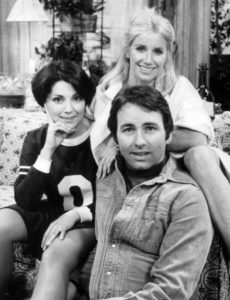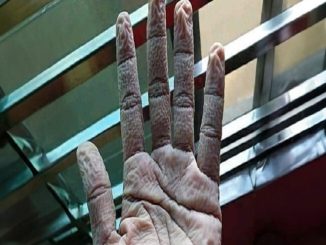
Decades may have passed since Three’s Company graced our screens, but its laughter still echoes in our hearts.
With unforgettable characters and side-splitting misunderstandings, this classic sitcom revolutionized the genre. Now, Joyce DeWitt reveals what really made the show a timeless treasure…

Public Domain
From the hilarious antics of three single roommates to the unforgettable performances of John Ritter and Suzanne Somers, Three’s Company remains a beloved staple of American television. It’s hard to believe it’s been 40 years since the series finale aired on ABC, yet its charm and humor still resonate today.
To illustrate how long ago Three’s Company became a hit, I just watched the intro. Seeing the shots from Santa Monica Pier during the show’s prime reminds me of how much has changed since they filmed there.
Sadly, neither John Ritter nor Suzanne Somers are with us anymore; both were taken from us far too soon. But keeping the spirit of Three’s Company alive is Joyce DeWitt, 75, who shares her vibrant stories and cherished memories from the beloved show.
”The most dear, precious, tender – and utterly unexpected – experiences that have come from working in ‘Three’s Company’ are the many, many adults who have told me that ‘Three’s Company’ was a safe haven they could count on during their teen years – for some, the only safe haven,” Joyce DeWitt told US Weekly.

Joyce DeWitt circa 1978. (Photo by Images Press/IMAGES/Getty Images)
Starring as Janet Wood alongside John Ritter and Suzanne Somers, DeWitt became a television icon and she was such a day brightener for millions.
She appeared in 171 episodes of the show between 1976 and 1984.
“It was such a gift. I mean, it was iconic. But who would have thought it?” Joyce DeWitt told The Spec. “All we were trying to do was make people laugh. When I think about it, the show was really an attempt to do a contemporary version of a 16th-century farce. It was about silliness running wild. I mean, we were talking about serious issues at times, but that was always somewhere underneath.”
“John Ritter used to say, ‘We don’t want people to just laugh but to fall over their couch laughing,’” she added. “The real issue was always the depth of friendship and the love those characters had for each other. That’s what drew people to them.”

Flickr
After Three’s Company ended, DeWitt stepped away from the spotlight for over a decade before making her comeback to acting.
Yet, no matter what she has accomplished or plans to do in the future, the vast majority will always connect her with that iconic show. And there’s a very simple reason for that, according to DeWitt.
“It was a ‘time out’ from the oppressive, challenging, difficult circumstances they were navigating in their young lives,” DeWitt says and adds:
“And, oh by the way, they say the characters also did stupid, crazy stuff that made them laugh. But it was the love, trust and support of the characters, one to the other, that made them lifelong fans.”

Public Domain
When you look at unedited photos from the Three’s Company set, the camaraderie among the cast shines through, especially in the images of Joyce DeWitt and Suzanne Somers, who played the beloved Chrissy Snow.
Both actresses delivered iconic performances, portraying young women navigating a male-dominated industry. They contributed just as much to the show’s success as John Ritter, and in those early days, their smiles in photos tell a story of friendship and collaboration.
Yet, beneath the laughter, tensions simmered. While Somers was celebrated for her role as “the dumbest blonde in America,” her fight for equal pay created rifts that would grow over time. As she demanded a 500% salary increase — from $30,000 to $150,000 — her relationship with DeWitt became strained. The set, once filled with joy, was now fraught with conflict.
Dan Bongino Reveals the Tragic Reason Why He Actually Left Fox News

Dan Bongino, a name synonymous with conservative commentary, has carved out a prominent place in American media. Born in New York on December 4, 1974, Bongino’s journey from a blue-collar upbringing to a key figure in conservative circles is a testament to his diverse career and unwavering principles. From his early days in law enforcement to his impactful presence in media and politics, Bongino’s life and career have been marked by resilience, strong convictions, and public controversy. His recent departure from Fox News in 2023 has raised questions about the future of his influence and career.
Early Life and Law Enforcement Career
Dan Bongino’s roots are humble; his mother worked in a supermarket, and his father was a plumber. This background gave him a down-to-earth perspective, much like the “new money” persona often referenced in popular culture. Bongino’s professional journey began with the New York Police Department (NYPD), where he served from 1995 to 1999. His commitment to public service led him to the U.S. Secret Service in 1999, where he protected Presidents George W. Bush and Barack Obama. His time in the Secret Service provided a deep understanding of national security and government operations, laying the groundwork for his later career in media and writing.
Transition to Media and Writing
In 2011, Bongino left the Secret Service and transitioned to a career in media. He quickly became known for his conservative viewpoints, which he articulated through books and television appearances. His first book, *Life Inside the Bubble*, published in 2013, offered an insider’s view of the Secret Service and the political dynamics within the federal government. This was followed by other works, such as *The Fight* and *Protecting the President*, where Bongino delved into national security, political issues, and the challenges faced by law enforcement agencies.
Bongino’s writing established him as a knowledgeable commentator, and his transition to media further amplified his voice. He became a regular contributor to Fox News and other conservative outlets, where his dynamic and passionate delivery resonated with viewers. His podcast and radio program, *The Dan Bongino Show*, reaches millions, making him a significant figure in conservative media.
Political Ambitions and Influence
Bongino’s influence extends beyond media; he has also ventured into politics, although with mixed success. He ran for Congress in Maryland’s 6th District in 2012 and the 8th District in 2014 but was not elected. Despite these setbacks, Bongino remained a vocal advocate for conservative principles, including limited government, Second Amendment rights, and strong national security. His political experiences, though not victorious, did not diminish his standing within the conservative movement.
Controversies and Personal Challenges
Bongino’s outspoken nature has made him a polarizing figure. His criticism of mainstream media and political opponents has sparked controversy, with supporters praising his dedication to conservative values and critics accusing him of divisive rhetoric. One notable incident in 2021 involved his wife, Paula Andrea Bongino, who was forcibly removed from a restaurant due to a misunderstanding. Bongino publicly defended his wife, turning the event into a commentary on how public figures and their families are treated.
In addition to public controversies, Bongino has faced significant personal challenges, particularly related to his health. In September 2020, he was diagnosed with Hodgkin’s lymphoma, a type of cancer affecting the lymphatic system. Despite the diagnosis, Bongino maintained a positive outlook and openly shared his journey with his audience, inspiring many with his resilience.
Departure from Fox News
Bongino’s career took a significant turn in 2023 when he announced his departure from Fox News. As the host of *Unfiltered with Dan Bongino*, he had become a staple of the network’s conservative commentary. However, disagreements over contract terms led to his exit, a move that surprised many of his fans. Bongino expressed dissatisfaction with the terms offered and decided to leave the network, marking a pivotal moment in his media career.
Conclusion
Dan Bongino’s journey from law enforcement to becoming a major voice in conservative media is one of resilience and adaptability. His departure from Fox News may have been a setback, but it has not diminished his influence. Through his podcast, social media presence, and continued media appearances, Bongino remains a significant figure in American conservative circles. His story is a reminder of the power of perseverance and the impact one individual can have on national discourse. As he continues to navigate his career and personal challenges, Bongino’s influence is likely to persist, fueled by his passion for the issues he holds dear.
Engage with Us
Do you think Dan Bongino’s departure from Fox News will significantly impact his career? Share your thoughts in the comments section below.



Leave a Reply